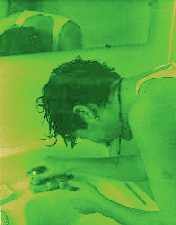
Richard Dyer, commenting on the "star system," notes that "A star's image is constructed both from her or his film appearances (typical roles, modes of presentation, performance and dress styles, etc.) and publicity (including promotion, advertising, fan magazines and gossip). In any particular film, this image is an already signifying complex of meaning and effect." For Hayworth, formerly Margarita Cansino, who was the daughter of an immigrant Spanish dancer named Eduardo Cansino, it was in a sense a masquerade doubled. According to the Hayworth biography, If This Was Happiness, she was subjected to physical, sexual, and emotional abuse by her father who marketed and commodified his daughter as his dancing partner in an act, which at one point was the "family's sole income." As Gilda, she performs in exchange either for a husband or Johnny's attention: it is through performance that she is both masochistic excess and breathless contained/uncontainable masquerade. Hayworth escaped from one master to another by "leaving her father's house" so to speak, and marrying another despot, which interestingly parallels Gilda's move from marrying Ballen Mundson to marrying Johnny Farrell.